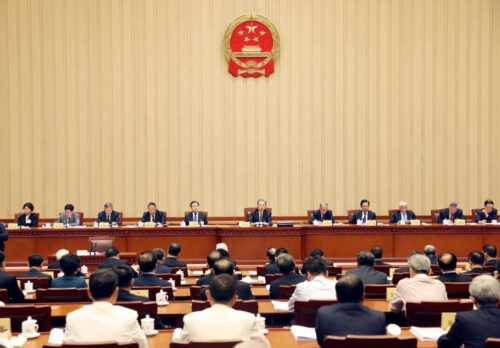Why Beijing will eventually end COVID zero and the tech crackdown — Q&A with Hong Hao
Bloomberg called Hong Hao an “outspoken China analyst” who is well known for “the accuracy of his forecasts” in August after he resigned from a Chinese state-run securities company following his bearish reports on the nation’s economy. What is he thinking now?

Hóng Hào 洪灝 was a China strategist at Bocom International, an investment bank and financial services firm under the Bank of Communications, one of China’s Big Four state-controlled banks. He is well known for “the accuracy of his forecasts,” according to Bloomberg.
In March this year, he posted negative views of COVID-zero policies and the outlook for China’s economy to his social media accounts — not just Twitter but also Weibo and WeChat, where he had millions of followers. His Chinese social media accounts were shut down, and he resigned shortly afterward.
In August, he joined GROW Investment Group, a Shanghai-based hedge fund, as its chief economist in Hong Kong. He continues to tweet frank views of China’s financial markets.
I chatted with him by video call late last week, before nationwide protests against China’s COVID-zero policy broke out, but his views on the COVID situation don’t really need an update.
Below is a lightly edited transcript of our conversation, with links added by me.
—Jeremy Goldkorn
COVID zero! Where is it going?
It feels like the last few weeks Beijing has been back and forth and the markets have reacted, some of it because of things you’ve said publicly! And then there were the demonstrations. Although the government messaging is still mixed, it does look like the curbs are going to be lifted, even if gradually.
Well, my understanding is that they’re finetuning the COVID-zero policy for now, and they are gradually relaxing the control. In recent days, the pace of reopening has actually stunned many.
They’ve already relaxed restrictions on foreigners coming into China. For example, the business visa processing and application process took only a few days. It used to take two months to get a business visa, and an approval letter from the Ministry of Foreign Affairs.
Also, the quarantine time: One year ago, it was 14 days in a quarantine hotel. Now it is 10 days, and will likely be reduced again. In my view, by springtime next year, they will further relax COVID controls.
Now, because once you relax and because of winter, peak season for flu and this kind of respiratory disease, so there’s going to be a surge in the number of cases. That has to happen, right? And with Omicron, because it’s so contagious, so there’s almost like there’s no middle way.
So, you either open fully or you just have to lock down the country, which is not sustainable. And with the data that we’ve been collecting, by now you’re seeing most of the cases are very mild, and many of them don’t have any symptoms at all. And there are very few severe cases. I think as we get to understand this virus, the mutated virus more, then I feel they will relax the controls further.
And we’ve done this for like three years now. I’m in Shanghai right now, so this time, after a year not being here, I felt a dramatic difference in people’s sentiment.
Many people feel depressed. Many restaurants are not open, most bars are closed. If they really want to stimulate the Chinese economy now, then I would say relaxing COVID controls is probably the best and easiest way.
What about the real estate business? Just last week, the central bank basically told some of the big banks that they had to incentivize lending to property companies.
They have to save it. If you look at real estate sales year on year, it’s down almost 40% year to date. And I think the smaller real estate developers are finding it really hard to cope. There are many defaults going into the fourth quarter, even though we have some relaxation of the property curbs.
So, they reduce interest rates, reduce down payments, reduce the requirements for people to be qualified to buy a second home. The thing is sales went up for like a week, and then just plunged again. So, people are just not in the mood to buy anything, really. They’re not even in the mood to go out. For example, this time when I’m here, I find it very difficult to get a face-to-face dinner with my friends because firstly, because people are quite unhappy, really.
And secondly, sometimes the restaurants close without notice because they have close-contact cases and they have to shut it down. And then sometimes my friends got have locked down in their buildings! Even I’m in Shanghai, I’m not seeing nearly enough people. A lot of friends that I wish to meet, after a year of not being able to see them, I still cannot see them even though I’m here.
When you buy a property, it’s a huge decision for any family really. And now, in China, property is so expensive.
If you compare the current period now with 2014, we had a similar episode. In 2013, they put in very restrictive property purchasing requirements, and they raised interest rates, down payment requirements. And if you already had your first home, then it was very difficult to buy a second or a third home.
In 2014, the inventory to sales ratio was 38 months at its highest. That is lots of inventory to get rid of, and that was back then. And this time is much worse. In 2014, at the worst point of the cycle, property sales year on year growth was down almost 20%. And now, we’re talking about 50%.
Property developers are running out of money. People are not in the mood to buy. And that becomes a vicious cycle.
I think it’s very significant that the People’s Bank of China is guiding the commercial banks to lend because there’s this “three red line policy” that says that commercial banks are only supposed to have a very low percentage of exposure of their total loans to real estate. And now, it seems to me that they’re throwing that away. That is a very implicit sort of stepping over the red lines to save the industry.
And I’m sure they can do it. In the worst-case scenario, in 2014, the China Development Bank expanded the balance sheet by more than a trillion yuan. That’s very high-power money. That’s a lot.
Now I think one of the policy banks has already expanded their PSL [pledged supplemental lending] facility twice. That’s quite significant, and then they can keep doing it. I think, in terms of monetary condition, it’s becoming more constructive for developers. But at the end of the day, you still have to give people enough confidence to purchase a property, which we’re not seeing just yet.
That’ll have to wait until maybe the COVID restrictions are over, do you think? Or is it more than that?
I think it’s more than that. Yeah. In 2014, it took a year to recover, right? The entire 2014, the whole property sector was struggling until the end of the year. I think this time we’re in a much worse situation, so it will take longer than that.
Let’s talk about technology. This is a sector where, like property, you’ve seen government attempts to basically change the landscape, common prosperity, the crackdown on the tutoring sector, the suspension of the Ant Group IPO, and dozens, literally dozens of moves against big tech companies.
But that also seems to be a reversing course.
I think you’re right. I think they’re trying to relax the leash they put on the technology sector. Gaming licenses are starting to get approved again. That is very significant for Tencent. Half of the company’s revenue is actually coming from gaming, so, it’s huge for that company.
Also, they fined Ant Group, I think a couple of billion U.S. dollars. Even though the amount is quite huge, but most of us in the market are seeing it as a sign that they want a closure of the case. And Ant can afford the fine. So most of us actually think that it’s good news.
Some other entrepreneurs such as Richard Liu [刘强东 Liú Qiángdōng] of JD.com, he donated further to charity, I think a couple hundred million U.S. dollars as well. And he’s restructuring his group.
There are signs that this is coming from the top. For example, they also asked the stock exchange to support stock offerings by many of the tech companies. That is a very strong sign as well. In the [private education sector, which has been the subject of yet another government crackdown], they have started saying that arts education for kids is very important, and they’re encouraging after-school training for kids in the fields of painting, piano playing, that kind of stuff…
…And also now, with all these bans from the U.S. on technology transfer, so obviously China needs money to be invested in this sector, and Tencent and Alibaba actually have been two of the bigger investors in the semiconductor industry. And that industry really needs to burn money to be able to come up with stuff
When you run the platform companies, it’s very easy to make money, right? The economies of scale are huge. And then they took some of the cash, and reinvested it in the semiconductor sector. It would be odd not to relax the leash on many of these companies. They need to grow again, so they generate enough cash to reinvest in the semiconductor industry.
So I would say the winds are changing. But China likes to do things in a gradual way. I think, over time, over the coming months, you’re going to see more and more changes in the sector, and that bodes well for the sector to come back.
What’s the sentiment in China about the domestic chip industry after the U.S. CHIPS and Science Act passed that aims to basically decapitate China’s semiconductor industry?
People are very disappointed. It’s as if the industry has been destroyed in China. People feel that way. You can’t blame them because the gap between China and the U.S. in terms of semiconductor development, it is just huge.
I would say that, as soon as the news came out, as soon as the Taiwanese engineers started to leave the country for the U.S., then yeah, people felt really despondent. In terms of the outlook for the industry, it would take years to catch up.
Last question: Electric cars and batteries! It feels to me that China clearly is in the lead worldwide when it comes to batteries, and just the sheer numbers of companies and the investments.
But this week there was some interesting news: Weltmeister, a Chinese Ev startup, is cutting salaries, cutting all kinds of costs, and it seems to be doing really badly. It made me think maybe we’ve reached the point…
We’ve seen this in China, going back even to the first dotcom boom, where you have a new industry, online video, blogging, a certain kind of ecommerce, P2P, whatever…everybody piles in, there’s like 2,000 companies overnight doing it. It’s chaos for a year or so, and then the government regulates it, and by attrition, you eventually end up with a few champions who actually do the job really well.
I feel like the news this week from Weltmeister is sort of the signal that we’re about to enter the period where the electric car frenzy is going to die down a bit, and we’re going to be left with a few really strong companies standing, but a lot of the less serious players are going to die. Does that make any sense?
Well, there was a communique from the government saying that the sector might be overinvested in the near term. So, they felt that, over a very short period, too much money has been invested in the EV industry.
But then at the same time, that is one of the industries where China has a clear lead on the rest of the world. And I think the government is trying to keep that lead. Also in terms of battery technology. CATL is the biggest battery company in the world.
I think for Weltmeister, I think it’s an individual case, in the sense that they couldn’t make a really good car that can sell to consumers. BYD is doing really well, right? Their cars are flying off the shelf and they claim that even if you order now, there’s a waiting time of a few months. Because they don’t have enough capacity to meet the demand.
Different companies have different challenges. BYD, even though they’re selling so many cars, the problem is that, because the margin is so thin. BYD is doing all this hard work and not getting enough margin. So, over time, it’s still going to get government support, but I think the support will be more in the upstream sectors. For example, battery technology, the mining of the lithium for the batteries, that kind of stuff.
Downstream for actually making the electric cars…You see so many people can rush in, in such a short time, it means that the entry barrier to make a car is actually quite low. So, that’s why everybody is doing it.
The Chinese government is very determined to have green energy, a green future for the country. They have already done so much to sort of reverse the damage to the environment in China. So, the deforestation problem, now the reafforestation project’s gone really, really well. Some of the desert in the northwestern region is now actually becoming green again. It’s amazing.






